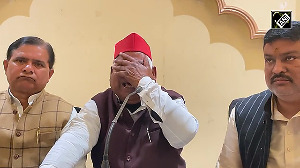Pakistan President Pervez Musharraf has reportedly agreed to opposition parties' demand to quit as army chief and submit his constitutional amendments to parliament for ratification.
A committee of second-rung leaders of the ruling Pakistan Muslim League (Quaid-e-Azam) and the six-party Muttahida Majlis-e-Amal, which held several rounds of talks to defuse the 11-month-old parliamentary crisis, announced in Lahore on Saturday that it had reached a broad understanding to table the amendments, known as the Legal Framework Order, in the national assembly after necessary modifications.
It said amendments would be presented to parliament soon after a meeting of all parties to be convened by Prime Minister Mir Zafarullah Khan Jamali.
"Both the sides termed the outcome of the dialogue as a step towards a resolution of the problem," official APP news agency said.
A declaration, which was released after the talks, said an understanding has been reached on separation of the office of president and chief of army, powers of president, retirement of judges and other contentious issues.
Government negotiator S M Jaffer told the Press Trust of India over phone from Lahore that Musharraf "in principle" has agreed that the posts of president and chief of army should not be held by one person.
He said Musharraf would discuss the date to relinquish the post of army chief in consultations with other parties.
Describing the outcome as a breakthrough, senior MMA leader Hafiz Hussain Ahmed told a private TV channel that Musharraf "has agreed not to continue in the army chief's post beyond 2004".






 © 2025
© 2025